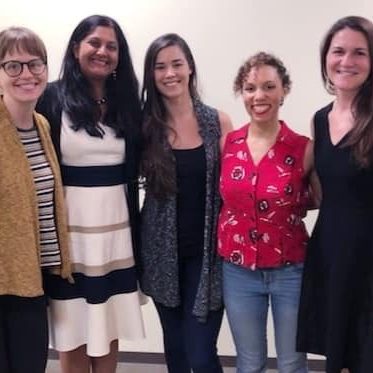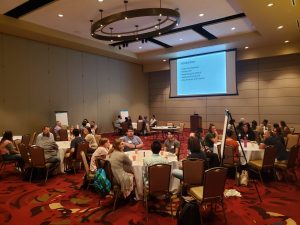Encouraging the Difficult Conversation
Difficult Dialogues is an initiative that is open to anybody in the campus community to come and have a conversation about race relations. It started with the idea that some students and faculty experience racism on A&M’s campus and other students are very unaware it is happening.
By Madison Brown

The Difficult Dialogues core team (L-R) Rebecca Costantini, current COMM PhD student; Dr. Srivi Ramasubramanian; Dr. Alexandra Sousa, former COMM PhD student; Vanessa Gonlin, current PhD in Sociology; Dr. Anna Wolfe. Not pictured: Asha Winfield, current COMM PhD; and Olivia Osteen, current COMM undergrad.
In an effort to make Texas A&M a more welcoming and inclusive campus, students, staff and faculty are invited to attend Difficult Dialogues on Campus Race Relations, Tuesday, Oct. 29 at 6 p.m. in MSC 2300D.
Difficult Dialogues was created in 2016 in response to a racist incident that occurred on campus, said communication professor and founding co-director Dr. Srivi Ramasubramanian. A group of students from Uplift Hampton Preparatory were visiting Texas A&M when they were subjected to racial slurs while in the Memorial Student Center, explained Ramasubramanian.
The university took immediate action to denounce the behavior and discipline the students involved. Some students started a letter writing campaign to Uplift Hampton Preparatory to apologize for the actions of fellow Aggies, recalled Ramasubramanian. Moved by the response to the incident, she created Difficult Dialogues.
“We don’t have to wait for these incidents to happen in order to have these conversations,” said Ramasubramanian. “Difficult Dialogues is an initiative that is open to anybody in the campus community to come and have a conversation about race relations.”

Difficult Dialogues on Campus has been orchestrated 18 times, co-founded by professors in the department of communication to address campus race relations and past instances of racism on the Texas A&M campus.
The workshop promotes active listening and creates a space where people can share honestly while feeling heard and validated in their experiences while discussing a difficult topic such as race relations, said Ramasubramanian.
It is important for students, faculty and staff who have experienced racism at A&M to
see their experiences represented and recognized by people at this university, to feel less isolated, and to have a sense of community that validates their experience, said Vanessa Gonlin, a sociology doctoral candidate and co-facilitator of Difficult Dialogues.
“Difficult dialogues really started with this idea that some students experience racism on A&M’s campus and then other students are very unaware that it is happening so we want to bridge that gap and show the perspectives of their classmates and peers,” Gonlin said.
It is important for students who do not experience racism on A&M’s campus to have a better understanding of what their classmates are going through, she said. It makes those students without firsthand experience of racism less likely to dismiss the experiences of their peers, she added.
All campuses need to be having diversity conversations with the student body, faculty and staff, said co-director and assistant professor Dr. Anna Wolfe.
“When we do that, we are able to create an environment that is more inclusive, that is more welcome to a wider range of people, and can facilitate the highest level of thought together,” Wolfe said.
Everyone is encouraged to attend the workshop, and it is okay for attendees to not have everything figured out, said Wolfe. Come with questions so those can be addressed in the workshop, she added.
The Difficult Dialogues team is comprised of co-directors, facilitators, notetakers and organizing team members. Each plays an integral role in the workshop.
“The facilitators are graduate students that sit at the small round table and actively guide the conversation to work the group through a series of questions,” explained Wolfe. “Their role is to make sure we are able to have the best conversation possible.
“The notetakers are undergraduate students that work with the facilitators to create a visual record of the conversation, which becomes an anchor throughout the course of the evening,” added Wolfe. “They help us keep track of the conversation.”
All who attend are encouraged come with an open mind and a willingness to engage, said Wolfe. Attendees can expect to receive resources to be part of building a positive environment at A&M.
“The workshop begins with opening statements by Dr. Srivi, then leads into icebreakers within small groups,” said Gonlin. “[Attendees] then read case studies and journal entries. Facilitators guide the discussion while notetakers jot down key points of the conversation.
“After small group discussions is a large group discussion lead by myself and another grad student,” she said. “The event ends with an explanation of techniques to combat microaggressions and racism on campus.”
Difficult Dialogues has been orchestrated more 18 times now, said Ramasubramanian. In addition to open invitation sessions, they have been invited to other colleges and organizations inside and out of A&M. Ramasubramanian recently talked about the Difficult Dialogues project at UC Santa Barbara and has been invited to go to Latvia in November to give a keynote on this topic workshop, she added.
“We are very pleased with the support and the tremendous positive response we have received from participants and the university,” said Ramasubramanian. “Now to see this is gaining prominence nationally and internationally, you can see the impact is not just within our campus community but within our discipline of communication.”
From a student perspective, Gonlin said she has yet to see improved race relations on A&M’s campus, but is hopeful for the future.
“We have an opportunity for people to begin this conversation. I haven’t seen behavioral outcomes yet, because we aren’t there yet,” said Gonlin. “This is the beginning; first you have to acknowledge the problem. In the future, when we have acknowledged it and implement what we can do as individuals and as a collective university, then there will be more change and enhanced relations.”
The event is free, but preregistration is required: https://calendar.tamu.edu/communication/view/event/event_id/128975
- Dept News
- Events
- Faculty
- In the Department
- Uncategorized
- Black Lives Matter
- Black Lives Matter TAMU
- COMM Alumn
- COMM Alumni
- COMM Graduate
- COMM Student
- COMM Undergraduate
- Communication
- Communication Workshop
- Difficult Dialogues
- Difficult Dialogues on Campus Race Relations
- Dr. Alexandra Sousa
- Dr. Anna Wolfe
- Dr. Srivi Difficult Dialogues
- Dr. Srivi Ramasubramanian
- Inclusion
- Inclusivity
- Latvia
- Media Rise
- Olivia Osteen
- Race Relations
- Race Relations Texas A&M
- Racism
- Racism on Campus
- Rebecca Costantini
- Sociology
- Srivi Communication TAMU
- Srivi Ramasubramanian Difficult Dialogues
- Srivi Ramasubramanian Media Rise
- TAMU
- TAMU Srivi Ramasubramanian
- Texas A&M Difficult Dialogues
- Texas A&M Race Relations
- UC Santa Barbara
- Uplift Hampton Preparatory
- Vanessa Gonlin
- workshop
